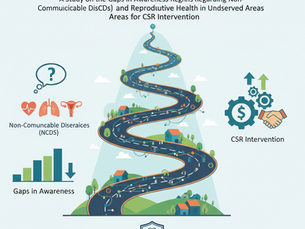top of page
All Posts


Diabetes Mellitus Type 2
The title "Dibites Miletus Type 2" appears to be a slight misspelling or variation of "Diabetes Mellitus Type 2," a widespread and critical global health concern. This chronic metabolic disorder is characterized by high blood sugar (glucose) levels, resulting from the body's ineffective use of insulin, a condition known as insulin resistance , or an inability of the pancreas to produce enough insulin to compensate. 1 Once commonly referred to as adult-onset diabetes, Type 2

NCRF
Sep 26, 20252 min read


Corporate Social Responsibility (CSR) Funding
Corporate Social Responsibility (CSR) funding refers to the internal regulation of a company's business model to ensure its actions are ethical and beneficial for society, the environment, and its stakeholders. The specifics of CSR funding can vary widely based on the country, the company's size, and its industry, but here are some key aspects, particularly highlighting the mandatory framework in India as a significant example: 1. Mandatory CSR in India (Companies Act, 2013)

NCRF
Sep 26, 20253 min read


Breast Cancer
Overview of Breast Cancer Breast cancer is a type of cancer that forms in the cells of the breasts. It is one of the most common cancers diagnosed in women, but men can also develop breast cancer. Types of Breast Cancer Ductal Carcinoma In Situ (DCIS): A non-invasive cancer where cells inside the ducts of the breast have changed to cancer cells but have not spread. Invasive Ductal Carcinoma (IDC): The most common type of breast cancer that starts in the ducts and invades s

NCRF
Sep 25, 20252 min read


Epilepsy and Seizure Disorders
Understanding Epilepsy and Seizure Disorders What is Epilepsy? Epilepsy is a neurological disorder characterized by recurrent, unprovoked seizures. These seizures are caused by abnormal electrical activity in the brain and can vary in intensity and duration. Types of Seizures Focal Seizures: These originate in a specific area of the brain and can be simple (without loss of consciousness) or complex (with loss of consciousness). Generalized Seizures: These affect both sides

NCRF
Sep 25, 20251 min read


Alzheimer's Disease
Overview of Alzheimer's Disease Alzheimer's Disease is a progressive neurological disorder that primarily affects memory and cognitive function. It is the most common cause of dementia among older adults, leading to a decline in the ability to perform everyday activities. Symptoms Memory loss Difficulty in problem-solving or planning Confusion with time or place Challenges in understanding visual images and spatial relationships Changes in mood and personality Withdrawal from

NCRF
Sep 25, 20251 min read


Mapping the Health Information Landscape: A Study on the Gaps in Awareness Regarding Non-Communicable Diseases (NCDs) and Reproductive Health in Underserved Areas for CSR Intervention
The global burden of disease is increasingly shifting towards non-communicable diseases (NCDs) such as hypertension, diabetes, and cardiovascular conditions, which often co-exist with persistent challenges in reproductive health. In many underserved communities, a significant barrier to effective prevention and management of these issues is a fundamental lack of health awareness and reliable information. This information vacuum is perpetuated by limited access to healthcare p

NCRF
Sep 22, 20251 min read


The Enduring Legacy: A Journey Through Medical Education in India
India, a land steeped in ancient wisdom and scientific discovery, boasts a medical education history as rich and complex as its cultural tapestry. From the revered texts of Ayurveda to the modern advancements in neuroscience, the journey of healing knowledge in this subcontinent reflects a continuous evolution, adapting to empires, philosophies, and global influences. Understanding this trajectory is not merely an academic exercise; it is a recognition of the foundations upon

NCRF
Jan 16, 20259 min read


Examining the Link Between Menstrual Health Awareness and Women's Productivity and School Attendance in a Developing Region: A CSR Impact Assessment
In many developing regions, menstrual health remains a significant public health challenge, often shrouded in social stigma and cultural taboos. This lack of open dialogue and accessible information on proper menstrual hygiene management has profound consequences, disproportionately affecting women and girls. These challenges are directly linked to tangible negative outcomes, including a high rate of absenteeism from school for adolescent girls and reduced productivity for wo

NCRF
Aug 15, 20241 min read


Sanitation & Hygiene
Sanitation and Hygiene are two inseparable concepts that form the bedrock of public health and are essential for disease prevention, dignity, and socio-economic development globally. While often used together, they refer to distinct but complementary practices. Sanitation: The Infrastructure of Health Sanitation primarily refers to the provision of facilities and services for the safe disposal of human excreta (feces and urine) and domestic wastewater. It is the crucial

NCRF
Jul 17, 20242 min read


Unveiling the "Anatomical Act" in India: A Deep Dive into Cadaveric Dissection and Medical Education
The human body is an intricate marvel, a complex symphony of systems that has fascinated scientists, philosophers, and healers for millennia. To truly understand its workings, direct observation and study are indispensable. This is where cadaveric dissection, a practice as old as medicine itself, plays a pivotal role. In India, the use of cadavers for medical education and research is governed by specific legislation, often referred to as the "Anatomical Act." This article wi

NCRF
Jan 6, 20246 min read


Respiratory Health
Respiratory health refers to the state of your respiratory system , which includes the nose, throat, trachea, airways (bronchi), and lungs. This vital system's primary function is to draw oxygen into the body and expel carbon dioxide (a waste product), a process essential for life and overall well-being. Good respiratory health means your lungs are working efficiently to maintain this crucial gas exchange, allowing you to breathe easily and engage in physical activity with

NCRF
Sep 14, 20232 min read


Medical Device Innovation Life Cycle
Medical device innovation is the process of translating a clinical need into a tangible, commercialized medical technology solution that ultimately improves patient care, diagnoses, or treatment outcomes. It involves a complex, multidisciplinary journey from concept and design to clinical adoption, encompassing not just engineering and science, but also navigating the heavily regulated healthcare ecosystem. The Medical Device Innovation Life Cycle The journey of a medical d

NCRF
Jul 15, 20232 min read


The "Healthy Heart, Healthy Life" Project: A CSR-Supported Study on the Effectiveness of Workplace Health Screenings and Educational Workshops in Reducing Cardiovascular Risk Factors
Cardiovascular diseases (CVDs) remain a leading cause of morbidity and mortality globally, with a significant portion of cases being preventable through early detection and lifestyle modifications. While public health campaigns have been instrumental, the workplace represents a crucial and often overlooked environment for health intervention. Many employees spend a considerable portion of their day at work, and factors such as stress, sedentary behavior, and poor dietary habi

NCRF
Feb 10, 20231 min read


Evaluating the Long-Term Behavioral Changes and Health-Seeking Behaviors After a Corporate-Funded Awareness Program on Cardiac and Reproductive Health for Employees and Their Families
Corporate Social Responsibility (CSR) initiatives have evolved from simple philanthropy to strategic interventions aimed at creating sustainable social impact. Within this scope, health and wellness programs targeting specific populations have become a key focus. This document provides an introductory framework for two distinct but related studies. The first investigates the use of modern digital channels—social media and mobile applications—as a tool for health education. It

NCRF
Sep 8, 20221 min read


A Study on the Efficacy of Corporate-Sponsored Health Camps in Improving Knowledge of Heart Attack Symptoms and Menstrual Health Practices in Urban Slums
Urban slums worldwide are characterized by significant health disparities, often stemming from limited access to healthcare, sanitation, and essential health information. This environment contributes to a high prevalence of preventable conditions and a poor understanding of critical health issues. Among the most pressing concerns are cardiovascular diseases, which are a leading cause of mortality, and the lack of proper menstrual health and hygiene knowledge, which impacts th

NCRF
Jul 9, 20201 min read


Neurodevelopmental disorders
Neurodevelopmental disorders are a group of conditions that originate in early development, typically before a child enters grade school, and are characterized by developmental deficits that produce impairments of personal, social, academic, or occupational functioning. These disorders encompass a wide range of conditions, each with its own unique set of challenges and characteristics, affecting how the brain functions and processes information. At the core of neurodevelopmen

NCRF
Nov 3, 20182 min read
bottom of page
